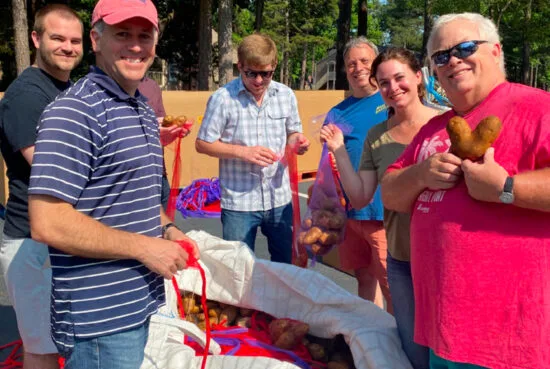
Join Together to Make A Difference

There are many ways to get involved locally.
Our network is here to ensure everyone in our communities has access to food and other essential resources – no matter where we live, where we’re from, who who we love, or the color of our skin. If your organization is in an underserved area and has the capacity to support, please don’t hesitate to reach out to our team at network@foodbankcenc.org.


Mobile Pop-up Markets

Network Membership

Find Options in Your Community
Network Values
Our local partners hold people facing hunger at the center of every decision – from the food we source and distribute, to the programs we invest in, to the policies we advocate for. Within this commitment, our network is guided by a set of core values:
Neighbor Focus
We’re here to provide food, non-food essentials, hope and support. The needs, challenges, and opportunities of our neighbors fuel our shared mission and goal to serve communities as best as we possibly can.
Partnership
We are stronger when we work together. We want to know each other, share resources, and leverage strengths to overcome challenges. Being an engaged partner means walking alongside one another and sharing the food, knowledge, and resources that are needed to reach a future where no one goes hungry.
Accessibility
The amount of food each partner distributes is secondary to how accessible those resources are to communities facing hunger. The frequency of distributions, the resources we offer alongside food, and how welcoming an environment we offer to neighbors are all key aspects of accessibility.
Health, Safety & Well-being
The health, safety, and well-being of our neighbors is our top priority. Each partner must adhere to high standards in food safety, community access to resources, and related reporting. Regular training on best practices, record-keeping requirements, and site visits are all elements of this commitment.
Community-led Solutions
Hunger is at its highest point in nearly 20 years and we continue to see record numbers of people seeking assistance across our network. Each partner must have strong connections and support in the local community, as well as capacity to adapt and grow to meet evolving needs.
– Food Bank Healthcare PartnerThe Food Bank staff are so friendly and helpful. They always explain procedures and availability of food items very patient and thoroughly. There are many options for food items for the patients we serve, and the variety and quality are very great for our patients, especially the produce items that we pick up weekly. We are always happy to see what the Food Bank of Central & Eastern North Carolina has for us!
Frequently Asked Questions — and Answers!
-
Who can join the Food Bank Network?
The Food Bank partners are registered 501(c)3 non-profits, government and community institutions, and healthcare, education, and faith-based organizations that operate a:
- Free food pantry
- No-cost market
- Meal site (sometimes called soup kitchens)
- Short-term housing/shelters
- Mobile market or food delivery program (such as Meals on Wheels)
- Senior or child nutrition programsWe do not currently partner with group homes, residential facilities, and daycare centers.
-
How do I apply to become a partner?
With more than 700 partners across our service area, most communities currently host at least one food assistance organization that is part of the Food Bank network. We encourage you to explore collaboration opportunities with the agency closest to you! Find nearby locations here.
-
How can I get involved while the Food Bank assesses partnership priorities?
We have a host of opportunities for groups to make a difference locally. Check out the links below to find an option that works best for your organization.
-
Can my organization receive food without formal partnership?
There are specific circumstances – such as disaster response – that that allow for one-time or short-term distributions. However, Food Bank-sourced food is generally only available to contracted partner organizations in our network.
-
Can I partner with Feeding America or other entities instead?
Feeding America is the national coalition of food banks, representing nearly 200 hunger relief hubs including the Food Bank of Central & Eastern North Carolina. All local organizations in our 34-county service area must contract with the Food Bank to become a member of the Feeding America network.
-
I'm outside your service area. Who can I contact about partnership?
There are seven food banks that serve North Carolina communities. If you are outside our 34-county service area, you can find a sister food bank in your area on this map.
Stay connected to the Food Bank
Sign-up to receive emails with updates, resources, and ways to get involved.